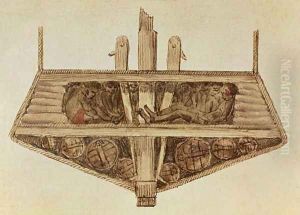Jacques-Henri Bernardin de Saint-Pierre Paintings
Jacques-Henri Bernardin de Saint-Pierre was a French writer and botanist, most famous for his novel 'Paul et Virginie', a staple of French 18th-century literature. Born on January 19, 1737, in Le Havre, he belonged to a family with maritime interests, which influenced his early life and works. Saint-Pierre's education began at a Jesuit school, but he later studied at an engineering school, harboring an interest in a military career.
However, his life took a significant turn when he ventured to Malta and then to Eastern Europe, where he was influenced by the natural environment and social structures he encountered. After various jobs and travels, including an expedition to the Isle of France (now Mauritius) as the superintendent of the royal botanical gardens, he returned to France with a wealth of botanical knowledge and a deep sense of social justice.
Saint-Pierre's writing career began in earnest in the 1770s, with his early works reflecting his interests in nature and human society. His most acclaimed work, 'Paul et Virginie', was published in 1788 and tells the story of two children growing up in an Edenic environment in Mauritius, only to face the corrupting influences of the outside world. This novel was a precursor to the Romantic movement and celebrated the harmony between humans and nature, resonating with the Jean-Jacques Rousseau-inspired ideal of the 'noble savage'.
Saint-Pierre's later works continued to reflect his preoccupation with social reform and the natural world. He was appointed to the National Institute during the French Revolution, where he had the opportunity to influence educational reforms. Throughout his life, he maintained a strong interest in botany, which he integrated into his writing.
Jacques-Henri Bernardin de Saint-Pierre passed away on January 21, 1814, leaving behind a legacy as a writer who sought to capture the beauty of nature and the simplicity of life, which he believed was being corrupted by civilization. His works continue to be celebrated for their lyrical quality and their philosophical exploration of human nature and society.
